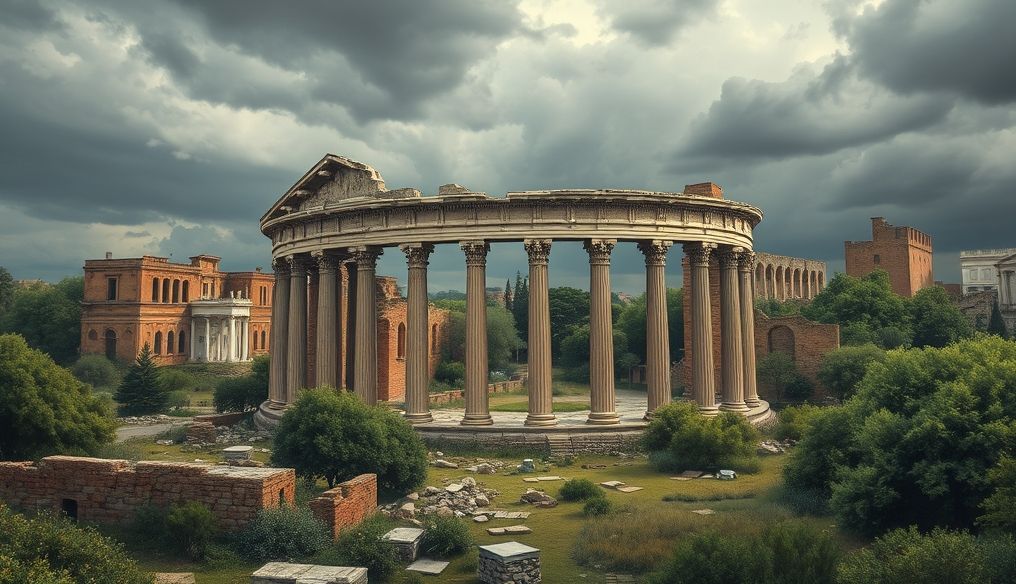Introduction: The Myth of the Library of Alexandria
The ancient Library of Alexandria, founded in the 3rd century BC in Ptolemaic Egypt, has always been associated with the idea of being a comprehensive repository of human knowledge. It is often said to have contained "all the books in the world," raising questions about the accuracy of this claim. Did it really contain all the knowledge available at that time? Or is this just a myth reflecting the ambitions of its founders?
Chapter 1: The Founding of the Library of Alexandria
The Library of Alexandria was founded during the reign of Ptolemy I Soter, one of Alexander the Great's generals and successors. The goal of its creation was to collect all the knowledge available in the known world at the time. The project continued under his successors, especially Ptolemy II Philadelphus, who made great efforts to expand the library and increase its holdings.
Founding Objectives:
- To collect and translate all Greek and non-Greek texts.
- To create a center for scientific research and scholarship.
- To promote Hellenistic culture in Egypt.
Chapter 2: The Size of the Library's Collection
Estimates of the size of the Library of Alexandria's collection vary widely. Some sources suggest that it contained between 400,000 and 700,000 scrolls. These scrolls were not necessarily complete books, but often papyrus rolls containing parts of literary or scientific works.
Types of Scrolls:
- Literary works (poetry, plays, epics).
- Historical and geographical texts.
- Philosophical and scientific works (mathematics, astronomy, medicine).
- Laws and official documents.
It is important to note that the library was not just a storehouse of scrolls, but also a center for copying, correcting, and translating manuscripts. This means that the size of its collection was constantly changing.
Chapter 3: Sources for Collecting Manuscripts
To achieve the goal of collecting "all the books in the world," the curators of the Library of Alexandria used a variety of strategies:
- Purchasing Manuscripts: They sent agents all over the known world to buy manuscripts.
- Seizing Manuscripts: It is said that they confiscated manuscripts from ships docking in the port of Alexandria, copied them, and then returned them to their owners.
- Gifts: They received manuscripts as gifts from kings and rulers.
- Translation: They translated texts from other languages into Greek.
Chapter 4: Limits of Knowledge in the Hellenistic Era
It is important to keep in mind the limits of knowledge available in the Hellenistic era. Although the library sought to collect all available knowledge, there were geographical regions and cultures that were not fully represented in its collections.
Regions and Cultures Not Fully Represented:
- The Far East (China, Japan, Korea).
- The Americas (were not known at the time).
- Sub-Saharan Africa.
In addition, there were branches of knowledge that had not yet developed at that time, such as modern science and advanced technology.
Chapter 5: The Role of Scholars in the Library of Alexandria
The Library of Alexandria was not just a storehouse of manuscripts, but also a center for scientific research and scholarship. The library attracted some of the most prominent scientists and thinkers of the time, including:
- Eratosthenes (mathematician and geographer who calculated the circumference of the Earth).
- Archimedes (mathematician, physicist, and engineer).
- Herophilus (anatomist and physician).
These scholars conducted research and studies in a variety of fields and authored important works that contributed to the advancement of human knowledge.
Chapter 6: Reasons for the Decline of the Library
The Library of Alexandria gradually declined over the centuries, due to a variety of factors, including:
- Wars and political conflicts.
- Fires (a large fire is believed to have destroyed a significant portion of the library).
- Lack of funding.
- Cultural and religious shifts.
The exact fate of the library remains a matter of debate among historians, but it is clear that it no longer existed by the end of antiquity.
Chapter 7: The New Library of Alexandria
In 2002, the new Library of Alexandria was opened, a modern institution that aims to commemorate the ancient library and restore its role as a center of knowledge and culture. The new library is located near the supposed site of the ancient library and contains a large collection of books and manuscripts, as well as modern facilities for scientific research and education.
Chapter 8: Conclusion: Between Truth and Myth
In conclusion, it is unlikely that the ancient Library of Alexandria truly contained "all the world's knowledge" in the literal sense of the word. However, it was certainly one of the largest and most important libraries in the ancient world and played a crucial role in preserving and disseminating knowledge. The myth of the Library of Alexandria reflects the ambitions of its founders and their desire to collect all available knowledge, and remains a powerful symbol of the importance of knowledge and culture.
References:
- Casson, L. (2001). Libraries in the Ancient World. Yale University Press.
- El-Abbadi, M. (1990). The Life and Fate of the Ancient Library of Alexandria. UNESCO.




